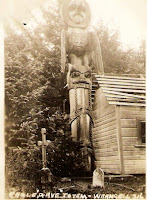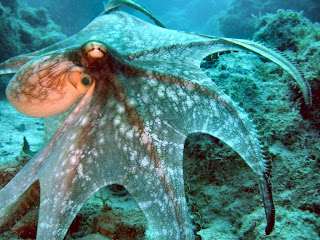FIRST CONTACT AT DOG POINT FISH CAMP
FIRST CONTACT AT DOG POINT FISH CAMP
All of us Lingít language participants line up our wares on plywood boards and makeshift tables at Dog Point outside of Sitka. Today, we’re told to expect a small group of tourists, who are coming to look at a real working fish camp. This is an immersion camp and we’ve sworn to speak only Lingít for the time that we’re here— four days. Eventually, we decide to speak English to the tourists.
For my family, the impact of first contact goes back to the 1700s. My daughter’s clan, and my adopted clan, the T’akdeintaan, were among the first to encounter the whiteman in Lituya Bay, Alaska. This was also the first time the Tlingits were given alcohol and sugar.
Now, about ten of us, old and young, have set up displays of beautiful handmade moccasins, shell and beaded necklaces, and the most exquisite beaded artwork. We wait until we see a small boat approaching the beach. A young woman from our group grabs the line and ties up the boat to a tree. About a dozen tourists disembark and stare up at the large dilapidated barge where we cook our food if it’s raining. Most of the time we cook our food outside under a shelter on a fire pit. Several large smokehouses and another house with sleeping quarters dot the shoreline. Smoke rises from the largest smokehouse now full of Sockeye. All the structures at Dog Point are built from whatever supplies that the Littlefields, the fish camp operators, have acquired over the years.
Most of the group passes by our tables; some
ignore us, walking up the beach. They point to the half-sunk house that once
housed another sleeping quarters. No one stays there now. There is an odd
silence among us. We had assumed, since we were the only people in the nearby
Alaskan wilderness, the tourists would be delighted to share in this
experience. But, no one asks questions, no one smiles, and no one buys
anything. We wonder if they know how much time it takes an elder to bead
moccasin tops, or whose hands fashioned the shell necklaces. Then as quickly as
they beached the boat, the tourists depart. Although, this was not an encounter
with La Pérouse’s ship at first contact, there remains an odd feeling.
*Previously published in the Citron Review.
 |
| Dog Point Fish Camp, Sitka, Alaska |
All of us Lingít language participants line up our wares on plywood boards and makeshift tables at Dog Point outside of Sitka. Today, we’re told to expect a small group of tourists, who are coming to look at a real working fish camp. This is an immersion camp and we’ve sworn to speak only Lingít for the time that we’re here— four days. Eventually, we decide to speak English to the tourists.
For my family, the impact of first contact goes back to the 1700s. My daughter’s clan, and my adopted clan, the T’akdeintaan, were among the first to encounter the whiteman in Lituya Bay, Alaska. This was also the first time the Tlingits were given alcohol and sugar.
Now, about ten of us, old and young, have set up displays of beautiful handmade moccasins, shell and beaded necklaces, and the most exquisite beaded artwork. We wait until we see a small boat approaching the beach. A young woman from our group grabs the line and ties up the boat to a tree. About a dozen tourists disembark and stare up at the large dilapidated barge where we cook our food if it’s raining. Most of the time we cook our food outside under a shelter on a fire pit. Several large smokehouses and another house with sleeping quarters dot the shoreline. Smoke rises from the largest smokehouse now full of Sockeye. All the structures at Dog Point are built from whatever supplies that the Littlefields, the fish camp operators, have acquired over the years.
 |
| Ida, Ethel Makinen, Irene Paul, Mary Anderson, Florence Shakely |
The tourists are instructed to look around and
they begin to walk across the beach toward us. They see our faces: elders,
adults, young children, teenagers, in varying skin shades. My daughter sits at
her table, her handmade jewelry spread out on a board. I notice she’s wearing a
statement on her t-shirt: “I am part White but I can’t prove it.” The picture
depicts the face of an Indian painted half-red and half-white. I smile and
point to her shirt and she giggles—It’s too late to change her shirt. We talk
in English to the few tourists who look over our tables.
 |
| Midori Kirby's daughters |
 |
| Vivian Mork, Yeilk', Cute-Little-Raven, my daughter. |
We are only perplexed for a moment, though. We
wander among our own tables, pulling cash out of our pants pockets, or
bartering. One jar of smoked cockles for a bracelet. Twenty dollars and a
baggie of abalone buttons for the beaded barrette. Together, my daughter and I
barter for a bear claw necklace. The elder who sells it to us says it will give
us strength, as we are both poets. We decide that we will start a new
tradition in our family.
*Previously published in the Citron Review.
Traditional
Native Values
from Dog Point Fish
|
It is important to:
|
Know your family tree
|
Know your clan history
|
Know your ancestral language
|
Know your kinship ties to others
|
Know your tribal
responsibilities
|
Have respect for all living things
|
Have a spirtitual relationship
in nature
|
Have respect for yourself
|
Have respect for others
|
Have respect for Elders
|
Provide for your family
|
Be loving to children
|
Share with Elders
|
Be skillful with tools
|
Be fair in trade and barter
|
Be physically strong
|
Be humble
|
Be brave
|
Work hard
|
Avoid conflict
|
Have a sense of humor
|
Be adaptable to circumstance
|
* Courtesy of Roby Littlefield and Dog Point Fish Camp



Comments